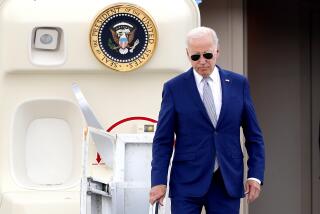Border Dispute Won’t Affect Thaw : India, China Leaders Say They’ll Be Friends
- Share via
BEIJING — The top leaders of India and China declared Wednesday that a long-festering and still-unresolved border dispute will no longer be allowed to poison relations between the two nations.
“Beginning with your visit, we can restore our relationship as friends,” China’s paramount leader, Deng Xiaoping, declared to Indian Prime Minister Rajiv Gandhi upon greeting him at the Great Hall of the People.
“The two countries’ leaders will become friends, the countries will become friends, the people will become friends,” Deng declared. “Do you agree?”
“I agree and would like to thank you for your warm welcome,” Gandhi replied.
‘Cooperative Relationship’
Later, at a press conference, Gandhi said that his visit “laid the foundations for a peaceful, stable and cooperative relationship between our two countries.”
Gandhi offered few details of any understandings about the disputed Himalayan border, along which each country claims large tracts of land occupied by the other. But he stressed that the two countries intend to maintain peace along the border as they expand their ties and try to negotiate a settlement.
“The border issue . . . goes deep into the psyche of our people, and it’s very complicated,” Gandhi said. “We can’t expect instant solutions.”
The two countries appear, however, to be headed toward an ultimate settlement based largely on the status quo, an outcome that China long has favored but that has been unacceptable to India.
Residue of Resentment
When the two nations went to war in 1962 over the disputed territories, China’s actions were portrayed in India as unprovoked aggression, leaving a residue of resentment that remains to this day. More recently, however, many observers have argued that actions by the Indian government, headed at the time by Gandhi’s grandfather, Jawaharlal Nehru, had actually played an important role in upsetting the status quo along the border.
Asked whether this background meant that a reassessment of the history of the 1962 conflict would be necessary before the Indian public could accept a border settlement, Gandhi replied:
“It is necessary to look at the reality of the situation, to look at the history of the situation, to look at the feelings that it has generated amongst the people, and then from there to try and work for a solution.”
Gandhi said that agreements on air services and on science and technology will be signed today, that cultural exchanges will be promoted and that the two countries will establish a commission to explore economic, scientific and technological cooperation.
He also said that he had invited Chinese Premier Li Peng to visit India and that Li had accepted. No date was set.
During his visit, Gandhi also has reaffirmed India’s view that Tibet is part of China and that India will not interfere in China’s internal affairs.
Cause of Tension
The Dalai Lama, Tibet’s former theocratic ruler, has lived in India since an abortive anti-Chinese uprising in 1959. His presence there, and the widespread sympathy in India for the cause of Tibetans who oppose Chinese control of their region, has contributed to tensions between India and China.
Beijing and the Dalai Lama now are exploring the possibility of holding talks on the future status of Tibet and the possible return of the exiled religious leader to China. Gandhi said that India has no involvement in this dialogue.
The new amiability between India and China comes at a time when the Soviet Union and China are also warming up their long-strained relations. The three countries were friendly in the 1950s, but in the 1960s both the Soviet Union and India clashed with China. Those disputes pushed the Soviets and the Indians into a closer friendship.
Gandhi denied, however, that what he called “a new beginning” in relations with China was prompted by Sino-Soviet moves toward closer ties.
“We started working for normalizing relations with China in 1985, long before the Sino-Soviet thaw came about,” he said. “I had a very long, very warm discussion with the then-Prime Minister (Zhao Ziyang) when we were both in New York for the United Nations session . . . . The process . . . is a continuing process. It’s independent of any other relationships.”
Zhao, who now is Communist Party general secretary, hosted a banquet for Gandhi on Wednesday evening. In remarks paraphrased by the official New China News Agency, Zhao said that on issues of peace and economic development, China and India “basically share the identical position.”
More to Read
Sign up for Essential California
The most important California stories and recommendations in your inbox every morning.
You may occasionally receive promotional content from the Los Angeles Times.













